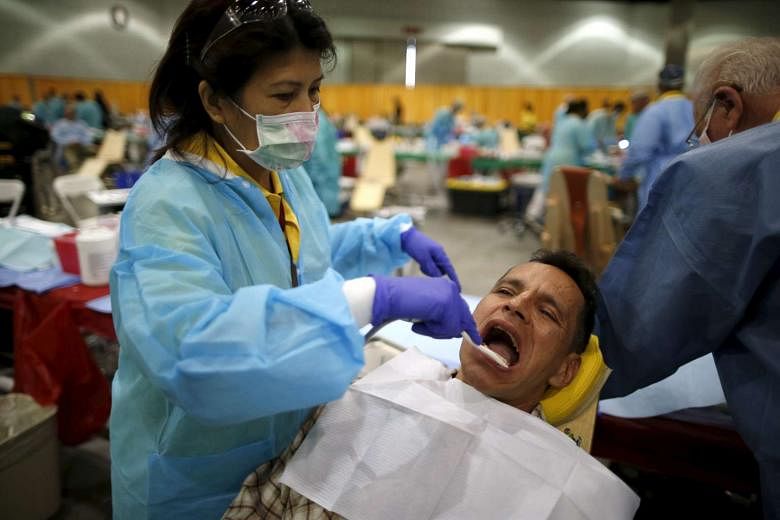Last month, the Government outlined plans to battle diabetes. More than 400,000 Singaporeans have diabetes, and one in three will be likely to get it in their lifetime.
For those with diabetes, one in three has not even been diagnosed.
Diabetics may be aware that their condition can affect their eyes, heart and other parts of their body, but they may not know that they are at risk of developing gum disease or periodontitis.
If you know you have diabetes, highlight your condition to the dentist, so he can make the necessary checks or modify treatment if necessary, said Dr Melissa Guay, a dental surgeon at the National Healthcare Group Polyclinics.
Here is a look at some of the common conditions you should tell your dentist about before seeking treatment and why:
DIABETES
This is a chronic disease that affects how your body uses blood sugar or glucose. Patients with diabetes are at an increased risk of periodontal or gum disease.
As with diabetes, which is best prevented early by maintaining a healthy lifestyle and avoiding obesity, periodontal disease can be prevented early.
Diabetic patients should get good, regular dental care and not wait until pain or other problems arise before seeking help, said Dr Helena Lee, dental specialist in periodontics, Specialist Dental Group.
This is because with periodontal disease, there is no pain at the start.
"Often, the bleeding gums are ignored. Even when teeth drift apart due to underlying bone loss, people still ignore it," said Dr Lee.
"By the time there is pain and recurrent swelling, the periodontal disease would have progressed too far ahead. Teeth with very little bone support will be loose and have to be extracted."
Diabetic patients should also keep their dentist informed of their HbA1c readings (this shows your average blood sugar level over the past two to three months) as elevated readings often correlate with poor healing, she said.
"Wounds that take longer to heal are more susceptible to infection."
HYPERTENSION
Those with this condition, also known as high blood pressure, should highlight it to the dentist as medications used to treat hypertension or heart disease may affect the mouth and gum tissues by causing reduced salivary flow or gum swelling, said Dr Lee.
And those with very high blood pressure should not even go for dental treatment.
Dr Guay said patients with blood pressure readings of above 180mm Hg (systolic) or 110mm Hg (diastolic) should defer going for dental treatment. "The stress and anxiety associated with dental treatment carries a risk of heart attack or stroke in patients with prolonged or severe hypertension."
Normal blood pressure is below 120/80mm Hg.
HEART ATTACK OR STROKE
If you have had a heart attack or a stroke, it is best to avoid going for dental treatment for about six months. If the dental treatment is urgent, it should be carried out in a hospital setting, said Dr Guay.
Patients may be on blood thinners, which help prevent harmful blood clots from forming in the body, but these would have an impact on dental treatments that can cause bleeding, she said.
The risk of bleeding can rise even with routine dental procedures such as scaling and polishing, extractions and minor surgery.
These patients should always inform their dentist that they are on these drugs so that the dentist can take the necessary precautions.
Also, the stress and anxiety associated with dental treatment, or drugs, can affect the person's blood pressure and precipitate angina (chest pain), or even provoke another heart attack during this period, said Dr Guay.
PREGNANCY
Traditionally, women have avoided going for dental treatment in the first trimester of their pregnancy due to the risk of miscarriage. Miscarriage occurs in 10 per cent to 15 per cent of all clinically recognised pregnancies in the first trimester, said Dr Guay.
There is, however, no evidence suggesting harm to the foetus if dental treatment is carried out during this period, she said.
In the last month of pregnancy, elective dental care is best avoided as a heavily pregnant woman may not be comfortable lying supine in the dental chair.
In between, pregnant women can and should go for routine dental cleaning such as scaling and polishing, said Dr Guay.
"Hormonal changes during pregnancy may cause a pregnant patient to become more susceptible to plaque and gingivitis (inflammation of the gums), also known as pregnancy gingivitis," she added.
If medication is prescribed, certain drugs - for instance, the antibiotic tetracycline - should be avoided as they may cause congenital abnormalities.
Lastly, no single diagnostic X-ray has a radiation dose sufficient to cause adverse effects in a developing embryo or foetus, according to the American College of Radiology, said Dr Guay.
However, if dental radiographs have to be taken for diagnostic purposes, a thyroid collar and abdomen lead shield should be used to be safe, she said.

